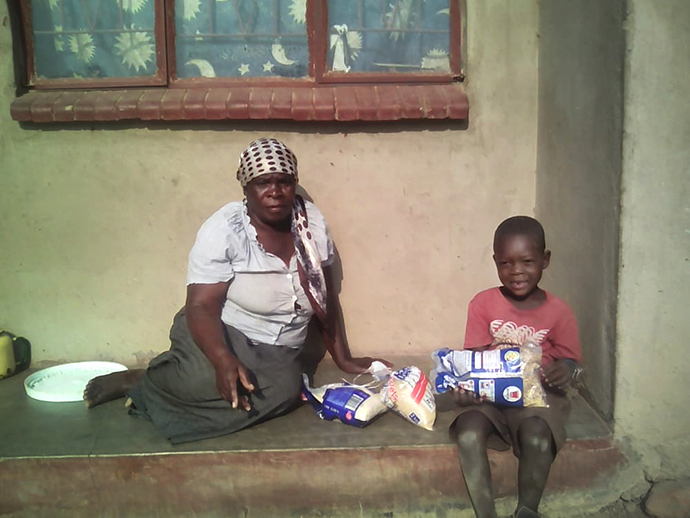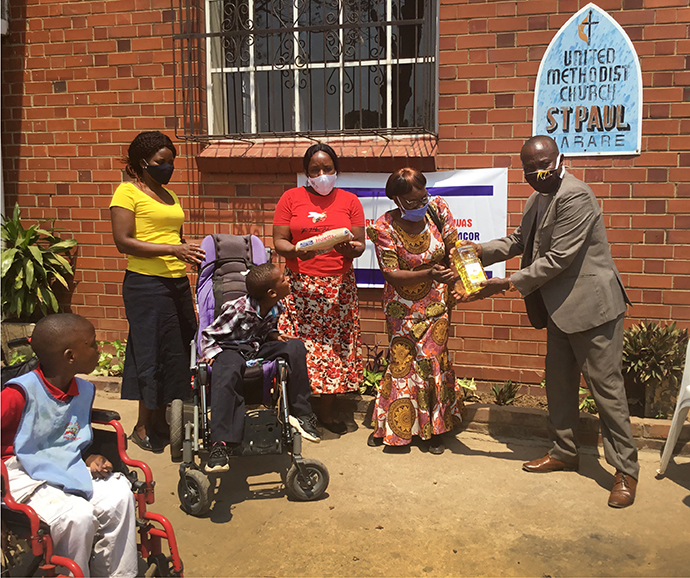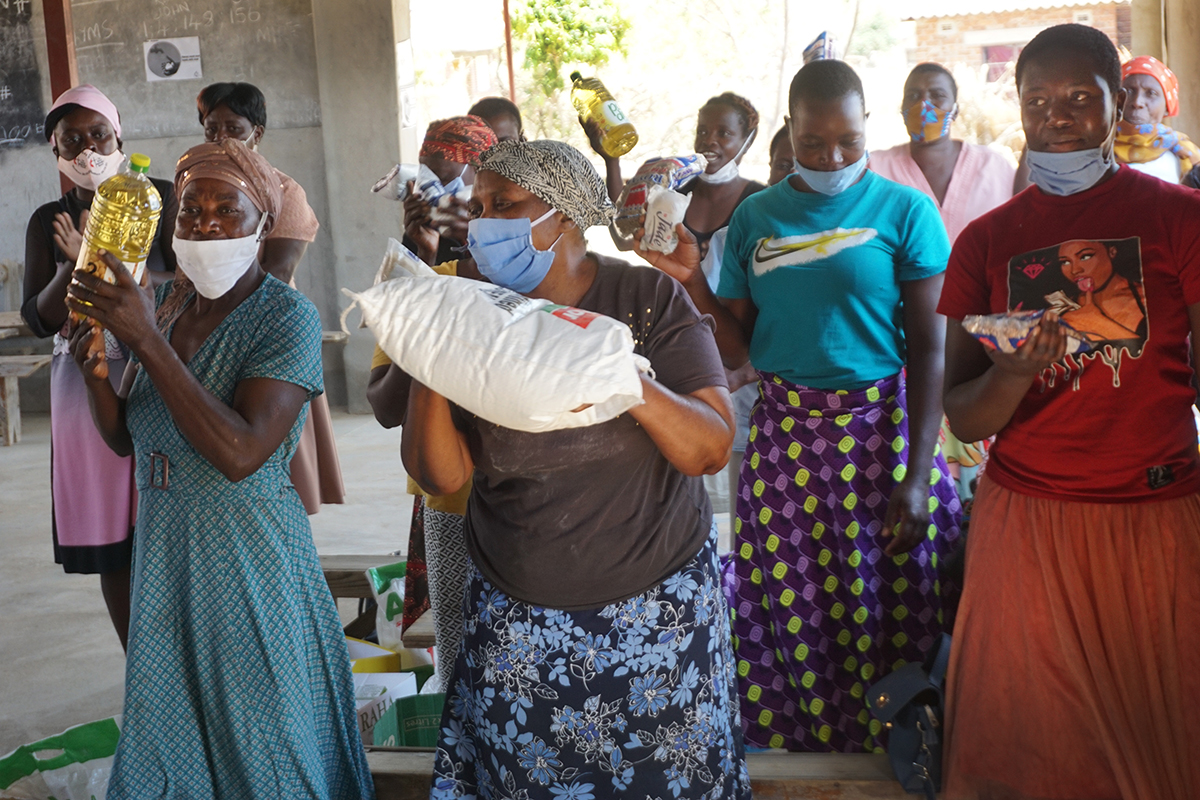United Methodists and their partners are putting resources together to address worsening food insecurity in Zimbabwe amid the COVID-19 pandemic.
The government-imposed lockdown to stop the spread of the coronavirus left many people without income and the ability to access food, leading to chronic household food shortages. Many in the country already were vulnerable because of the country’s economic crisis and poor rain and erratic weather patterns that have affected crops. The World Food Program said that 7.7 million people — half of the population in Zimbabwe — will face food insecurity this year.
The dire situation has compelled local church members and other groups to intervene.
The Nyadire Connection, an all-volunteer group founded by individuals from a network of United Methodist churches in Pittsburgh, has turned its attention to food relief during the pandemic.
“At this time, we consider the hunger situation our No. 1 priority,” said Nyadire Connection chairperson Drew Harvey, noting that the group has 12 programs with Nyadire United Methodist Mission, supporting orphans, giving educational sponsorships, rebuilding rural clinics, and operating medical and health programs.

United Methodist Ruseni Yeni and her 6-year-old great-grandson, Junior, depend on well-wishers to get by during the COVID-19 pandemic. They were among the recipients of food aid distributed by The United Methodist Church in the Harare East District of Zimbabwe. Photo by Kudzai Chingwe, UM News.
So far this year, The Nyadire Connection has provided $45,300 to purchase and distribute food. The food bundles cost $18 U.S. each and are distributed to families who live or work at Nyadire Mission, pastors in the Mutoko-Mudzi district, staff at six rural health clinics and a few selected area families.
Harvey said that the bundles help over 400 families.
“We hope to continue providing monthly food distribution for the next six months if we can raise the funds,” he said, adding that they have sent out an appeal for donations with the objective of raising another $45,000.
Church members in Zimbabwe also are pitching in to help through their districts.
Due to the degree of hunger being experienced within the Harare East District, the Rev. Oscar Nyasha Mukahanana, superintendent, launched a DS Cheer Fund in May. The first distribution was done in September in the Goromonzi community.
“The main objective was for individuals and corporations to donate toward the fund so that the church can buy food hampers for the underprivileged,” said Mukahanana.
Norah Muchena, a widow and a member of the Goromonzi Circuit, said she survived through the support net from neighbors.
“They help me with food items, water and firewood,” she said. “I suffer from numerous ailments, which have destroyed my life and forced me to stay indoors. I cannot look after myself, neither can I go bathing or do my laundry.”
Since she cannot walk, she worries about obtaining her medication, which she said at the time was three days from running out.
“This donation from my church will go a long way in alleviating my suffering,” Muchena said. “I always pray to God to enable me to walk again so that I can go to church. My church helped me to bury five children and now I am left with three.”
The United Methodist Committee on Relief provided a $17,550 Sheltering in Love grant from its COVID-19 Response Fund for food aid in the Zimbabwe Episcopal Area. The program was created to help United Methodists and denominational partners support local communities during the pandemic. Through that fund and additional support from UMCOR’s parent agency, the Board of Global Ministries, some $2.3 million has been distributed through 230 Sheltering in Love grants.
Dr. Morgan Jeranyama, humanitarian and relief technical advisor for The United Methodist Church, said the grant allowed the purchase of 923 hampers of basic food items, including cooking oil, mealie meal (cornmeal), sugar, rice, beans and soya chunks.

Students at the Chengaose Day Care Center Trust for physically challenged children receive food aid at St. Paul United Methodist Church in Mbare, Zimbabwe. A grant from the United Methodist Committee on Relief helped purchase more than 900 hampers filled with basic food items, including cooking oil, mealie meal (cornmeal), sugar, rice, beans and soya chunks. Photo by Chenayi Kumuterera, UM News.
Two homes caring for the disadvantaged — an elder care home and a rehabilitation center for the mentally challenged — and 20 families whose children are enrolled at Chengaose Day Care Center Trust in Mbare were assisted. Chengaose takes care of children living with disabilities, Jeranyama said.
Troy Firiyu, whose 9-year-old daughter, Anisha, is a student at Chengaose, received a hamper and was thankful for the support.
Due to Anisha’s disability, Firiyu said, “I cannot ferry for the family since she needs maximum attention.” He said Anisha’s mother remarried and is not around.
“This support will reduce my stress and give me a breathing space,” he said.
Another parent, Chenai Manyarara, said it is difficult to go shopping because she has to care for her physically challenged 15-year-old son.
“I am so glad that UMCOR has empowered us with these food hampers,” she said.
The Rev. Jairous Mafondokoto, superintendent of the Masvingo District in the Zimbabwe West Conference, said that the situation in his area is critical.
“Due to high demand for food, the first priority was on vulnerable households headed by the elderly, singles, children and the physically challenged. Those with large families and families with orphans were also given preference,” Mafondokoto said.
Sheltering in Love grants from the United Methodist Committee on Relief are helping churches in Zimbabwe provide pantry staples to communities where the coronavirus pandemic has created food shortages. Priscilla Muzerengwa reports for UM News.
“The families were very grateful to UMCOR, for they managed to have at least one meal a day for some few weeks,” Mafondokoto said.
Ruseni Yeni and her great-grandchild Junior rely on well-wishers to survive. A member of the Goromonzi Circuit in the Harare East District, she began watching the 6-year-old after he was orphaned at 3 months.
“Daily, we wait patiently for well-wishers to give us anything to eat. Sometimes we fail to get, but God always gives us hope, like what happened today,” she said.
Earlier that day, Junior had traveled to a relative’s home over three miles away to ask for food.
“We had nothing. Not even a drop of cooking oil or teaspoon of mealie meal,” said Yeni.
Of Yeni’s seven children, only two are still living. She said the others died of HIV-related illnesses.
“I used to stay with two grandchildren, but due to COVID-19, they have just left in search of food and have not since returned, leaving me with Junior,” Yeni said. “I thank the church for remembering me and Junior during these hard times.”
Gorden Chitehwe, a member of Eastview Circuit in the Harare East District, expressed his joy on receiving the food hamper.
“I never thought there are still well-wishers who could think of me during these difficult times,” he said.
“The day seems like a year, when without food. We do not fear COVID-19, but hunger. In my house alone, I could hardly sleep thinking what tomorrow holds for me. Sometimes, I wish I could die, but God has his plan for me,” Chitehwe said.
Mukahanana said the support was an indication that the church has recognized the effects of COVID-19.
“It was a moment which made the church to be relevant in the community. However, the coverage was minimum as compared to the demand. Most aged people are going for days without food,” he said. “Despite that, there was joy written all over their faces as they received their share.”
Chingwe and Kumuterera are communicators in Zimbabwe.
News media contact: Vicki Brown at (615) 742-5470 or newsdesk@umnews.org. To read more United Methodist news, subscribe to the free Daily or Weekly Digests.
Like what you're reading? Support the ministry of UM News! Your support ensures the latest denominational news, dynamic stories and informative articles will continue to connect our global community. Make a tax-deductible donation at ResourceUMC.org/GiveUMCom.




